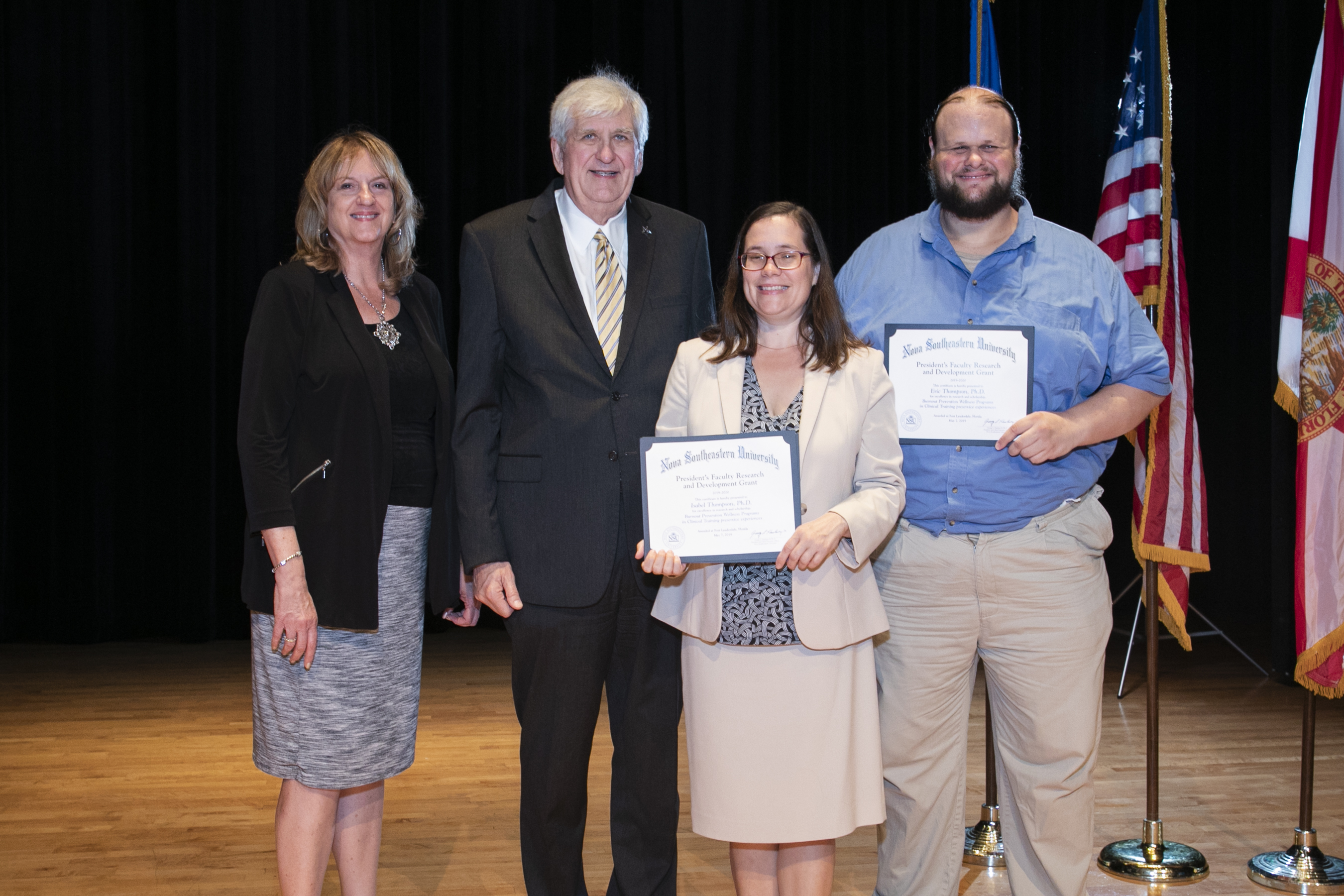Burnout Prevention Wellness Programs in Clinical Training preservice experiences
Grant Winners
- Eric Thompson, Ph.D. – College of Psychology
- Isabel Thompson, Ph.D. – College of Psychology
- Sarah Valley Gray, Psy.D. – College of Psychology
- Jessica Haas, Ph.D. – College of Psychology
- Caroline Talbot, BA – College of Psychology
- Janet Roseman, Ph.D. – College of Osteopathic Medicine
- Broward County Public Schools
Dean
- Karen Grosby, Ed.D. – College of Psychology
Abstract
 The importance of addressing student personal wellness has gained attention and importance in the helping professions, including counseling and psychology (Thompson, Amatea, & Thompson, 2014;(Grise-Owens, Miller, Escobar-Ratliff, & George, 2018; Roach & Young, 2007; Wise, Hersh, & Gibson, 2012)). Research that supports the wellness levels of students in graduate programs in an attempt to reinforce this awareness and skills early on have increased as well (Zahniser, Rupert, Dorociak, 2017; Wolf, Thompson, Thompson, & Smith, 2012). Few of these studies, however extend beyond advocating for wellness and self-care and into actions or programs that will help graduate students in training. Wellness advocacy, is the promotion of the crucial nature of wellness for clinicians. With increased frequency, national accrediting bodies for school counselors and psychologists have advocated for and require self-care as a method of reducing burnout and compassion fatigue(Santana & Fouad, 2017; Wise et al., 2012). A variety of interventions have been developed to enhance wellness, prevent burnout, or help reduce the effects of burnout. Examples of these interventions include elective courses that focus on wellness (Schure et al., 2008) and co-curricular wellness workshops for counselors (Wolf et al., 2012). School counselors and psychology trainees may benefit from an empirically based explicit wellness/self-care plan during their practicum/internship experiences.
The importance of addressing student personal wellness has gained attention and importance in the helping professions, including counseling and psychology (Thompson, Amatea, & Thompson, 2014;(Grise-Owens, Miller, Escobar-Ratliff, & George, 2018; Roach & Young, 2007; Wise, Hersh, & Gibson, 2012)). Research that supports the wellness levels of students in graduate programs in an attempt to reinforce this awareness and skills early on have increased as well (Zahniser, Rupert, Dorociak, 2017; Wolf, Thompson, Thompson, & Smith, 2012). Few of these studies, however extend beyond advocating for wellness and self-care and into actions or programs that will help graduate students in training. Wellness advocacy, is the promotion of the crucial nature of wellness for clinicians. With increased frequency, national accrediting bodies for school counselors and psychologists have advocated for and require self-care as a method of reducing burnout and compassion fatigue(Santana & Fouad, 2017; Wise et al., 2012). A variety of interventions have been developed to enhance wellness, prevent burnout, or help reduce the effects of burnout. Examples of these interventions include elective courses that focus on wellness (Schure et al., 2008) and co-curricular wellness workshops for counselors (Wolf et al., 2012). School counselors and psychology trainees may benefit from an empirically based explicit wellness/self-care plan during their practicum/internship experiences.The goal of the proposed study is to develop, in collaboration with the district supervisor for Broward County School Counselors, and a faculty member from the College of Osteopathic Medicine, a self-care plan based on contemplative/mindfulness theories and the 5F-Wel model (Myers; & Sweenty, 2005). The 5f-Wel model of Wellness measures life task constructs described by Humanistic theorist Alfred Adler. Such tasks include creativity, physical health, mental health, and spiritual wellness (Wolf et al, 2012). A series of workshops will be developed and provided for clinicians in training to introduce alternative and complementary self-care strategies. This wellness/self-care curriculum will be embedded into the existing supervision courses that are required for school counseling and school psychology trainees during their practicum and internship experiences. Participation in the study will be voluntary – students will be given a choice to opt in or opt out of the workshops as well as the research study.